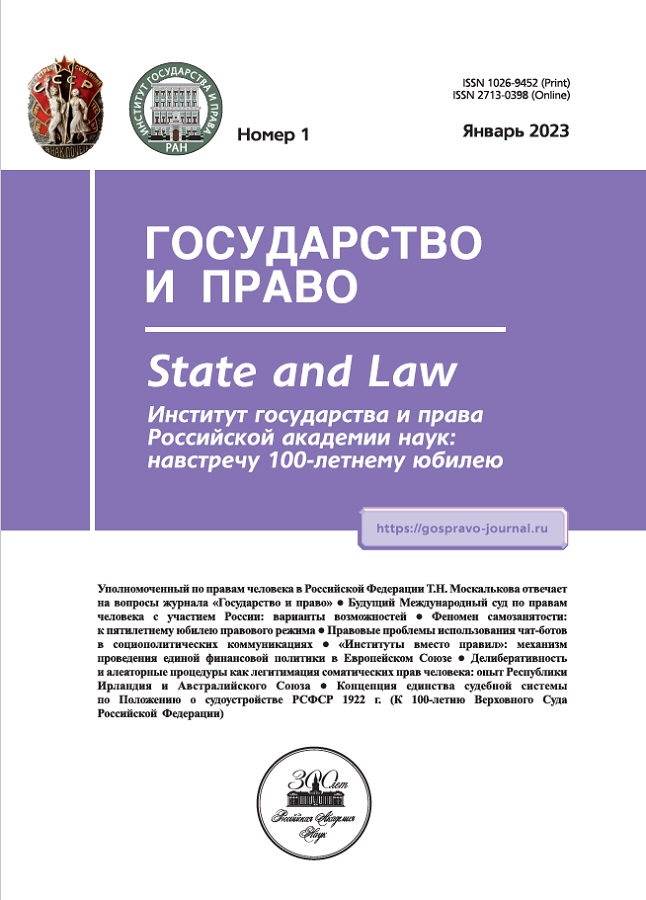The hypothesis of reasonable equality in freedom: basic provisions
- Authors: Gilmullin A.R.1
-
Affiliations:
- Kazan (Volga region) Federal University
- Issue: No 1 (2023)
- Pages: 162-167
- Section: Scientific reports
- URL: https://rjmseer.com/1026-9452/article/view/648804
- DOI: https://doi.org/10.31857/S102694520024141-6
- ID: 648804
Cite item
Abstract
The author focuses on rational equality in freedom, considered as one of the essential features of a certain type of legal understanding.Special emphasis in the work is placed on the fundamental foundations of legal freedom, the formation and development of which, according to the author, occurred as a result of the evolutionary exclusion and reduction of non-viable, destructive to the social structure of human behavior models - reasonable selection. It is reasonable selection that has shown that the only brainchild of the culture of all mankind that can become a reasonable means of ensuring the safe and effective realization of human needs is a right expressing a certain freedom, which is based on the imperative of preserving human nature.The author substantiates the following thesis: in order for everyone to claim freedom based on the imperative of preserving human nature, that is, in order to achieve reasonable equality in freedom, such freedom must be expressed in an equal form, through which the same and normative distribution of such freedoms will be ensured.As a result of the analysis, the main conclusions are formulated that the right, the essential features of which come from the foundation of freedom – the imperative of preserving human nature, implemented on the basis of an equal form, can be interpreted from a different point of view – rationally egalitarian, based on ensuring rational equality in the process of regulating social relations.
Full Text
About the authors
Ainur Razifovich Gilmullin
Kazan (Volga region) Federal University
Author for correspondence.
Email: Gilmullinainur@yandex.ru
Russian Federation, Kazan
References
- Gilmullin A.R. Preservation of humanity as the fundamental basis of law // Antinomies. 2021. Issue 1. Vol. 21. P. 61 - 77 (in Russ.).
- Hobbes T. Essays: in 2 vols. M., 1991. Vol. 2. P. 98 (in Russ.).
- Zhukov V.N. Philosophy of Law: textbook for universities. M., 2019. P. 305 (in Russ.).
- Kant I. Metaphysics of morals. Part I. Metaphysical principles of the doctrine of law [Electronic resource] // Civil society in Russia: scientific electronic library. URL: http://www.civisbook.ru/files/File/Kant.Metaphisika_1.pdf (accessed: 27.07.2020) (in Russ.).
- Lazarev V.M., Fedorova V.G. The principle of legal equality and legal responsibility (problems of methodology and theory of interrelation). Volgograd, 2005. P. 5, 26 (in Russ.).
- Malakhov V.P. Nature, content and logic of legal consciousness: abstract ... Doctor of Law. M., 2001. P. 28 (in Russ.).
- Nersesyants V.S. General theory of law and the state: M., 2015. P. 29, 30 (in Russ.).
- Nersesyants V.S. Philosophy of Law: textbook for universities. M., 2005. P. 20 (in Russ.).
- General theory of law and the state: textbook / ed. by V.V. Lazarev. 3rd ed., reprint and add. M., 2001. P. 15 (in Russ.).
- Soloviev V.S. Law and morality. Minsk; Moscow, 2001. P. 16, 20, 101 (in Russ.).
- Philosophy of Law of the Pentateuch: collection of articles / comp. P.D. Barenboim; ed.: A.A. Guseynov, E.B. Rashkovsky. M., 2012. P. 10 (in Russ.).
Supplementary files










